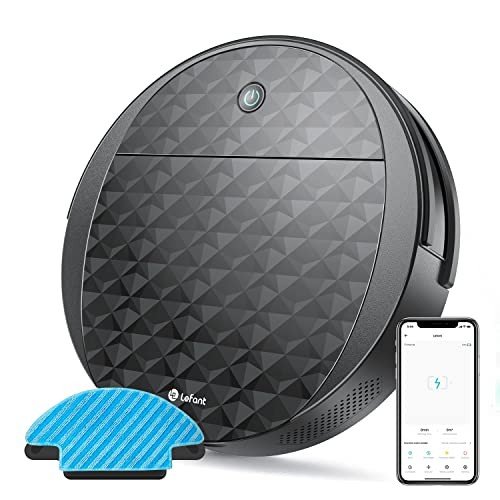The Rise of Robotic Vacuum Cleaners: A Comprehensive Overview
Robotic vacuum cleaners, when a high-end product primarily used by tech enthusiasts, have actually become a staple in lots of households worldwide. Offering benefit and effectiveness in home cleaning, these automated gadgets provide an engaging option for busy individuals and families alike. robot hoover and mop UK explores the world of robotic vacuum cleaners, exploring their functions, benefits, restrictions, and the innovation that drives them.
Comprehending Robotic Vacuum Cleaners
Robotic vacuum cleaners, typically described simply as "robot vacuums," are little, disc-shaped makers created to immediately tidy floors. They are equipped with various sensing units, brushes, and powerful suction mechanisms to ensure they can navigate around furnishings and other challenges while gathering dirt, dust, and debris.
Secret Features of Robotic Vacuum Cleaners
- Autonomous Operation: These vacuums can operate separately, following an established cleaning schedule or reacting to commands via mobile phone apps or voice assistants.
- Smart Navigation: Advanced designs utilize algorithms and mapping technology to navigate around a home, adjusting their path based on room design.
- Several Cleaning Modes: Many robotic vacuum cleaners can clean up in various modes, such as spot cleaning for concentrated areas or edge cleaning for wall borders.
- Self-Emptying Capabilities: Some high-end designs have a docking station that enables them to empty their dustbin automatically.
- App Integration: With Wi-Fi connection, users can control their robot vacuum through a mobile app, allowing them to keep an eye on cleaning development or set schedules remotely.
Advantages of Robotic Vacuum Cleaners
The increase in popularity of robotic vacuum can be attributed to a number of benefits:
- Time-Saving: Automated cleaning allows users to maximize their time for other activities.
- Convenience: Users can program their vacuums to clean on a set schedule, guaranteeing a consistently tidy home without manual effort.
- Versatility: Robot vacuums can clean numerous floor types, including hardwood, tile, and carpet.
- Compact Design: Their little, low-profile design permits them to gain access to narrow areas under furniture that traditional vacuums would miss.
Limitations of Robotic Vacuum Cleaners
In spite of their lots of advantages, robotic vacuum cleaners likewise have some limitations:
- Price Range: High-quality models can be quite costly, which may be a barrier for some consumers.
- Battery Life: While lots of models can clean big locations, battery life might restrict extended cleaning sessions, needing a go back to the battery charger midway through.
- Restricted External Features: Unlike conventional vacuums, many robotic models may struggle with deep cleaning, particularly on high-pile carpets.
- Barrier Navigation: While they have advanced sensors, robotic vacuums can often get stuck on cords, rugs, and other small obstacles.
Popular Brands and Models
The market for robotic vacuum cleaners is crowded, but a few brand names stand apart for their performance and functions. Below is a comparison of some leading brand names and their noteworthy models:
| Brand | Design | Key Features | Price Range |
|---|---|---|---|
| iRobot | Roomba i7+ | Automatic dirt disposal, advanced mapping and navigation, app control | ₤ 800 - ₤ 1,100 |
| Roborock | Roborock S7 | Concurrent mopping, laser mapping, powerful suction, multi-floor cleaning | ₤ 600 - ₤ 750 |
| Ecovacs | Deebot Ozmo T8 | Mopping and vacuuming, obstacle avoidance, home monitoring features | ₤ 700 - ₤ 950 |
| Neato Robotics | Neato D7 | D-shape style for edge cleaning, advanced navigation, numerous cleaning modes | ₤ 600 - ₤ 800 |
| Shark | ION Robot 750 | Budget friendly, decent suction, easy navigation | ₤ 350 - ₤ 500 |
The Technology Behind Robotic Vacuum Cleaners
While the concept of a self-cleaning device might appear futuristic, the innovation utilized in robotic vacuums is based on well-developed concepts of automation and robotics. The following are necessary components that enable their operation:
- Sensors: Most robotic vacuums come equipped with a mix of infrared and cliff sensing units to discover walls, edges, and changes in terrain. automatic hoovers avoids falls and navigates around obstacles.
- Cams and Lidar: Advanced models use video cameras or Lidar (Light Detection and Ranging) innovation to develop in-depth maps of the cleaning area, enhancing their cleaning course.
- Artificial Intelligence: Many more recent models employ AI and machine learning algorithms, allowing them to analyze cleaning patterns and enhance effectiveness with each usage.
FAQs about Robotic Vacuum Cleaners
Are robotic vacuum worth the financial investment?
Yes, numerous users discover them to be a beneficial financial investment due to their ability to save time and preserve cleaner floorings with minimal effort.
How do I maintain my robotic vacuum cleaner?
Routine maintenance includes emptying the dustbin, cleaning filters, and removing any hair or particles from the brushes and wheels.
Can robotic vacuum cleaners deal with pet hair?
A lot of models are specifically created to get pet hair; however, users should examine product requirements to make sure efficiency for their particular needs.
Do I require to be home for my robot vacuum to clean up?
No, lots of robotic vacuums can run separately, allowing users to arrange cleanings or control them remotely via an app.
How do I select the right robotic vacuum?
Consider aspects such as floor type, family size, specific cleaning needs (like pet hair), preferred functions, and budget plan before deciding.
Robotic vacuum cleaners represent an impressive crossway of convenience and innovation, supplying users with an efficient way to maintain their homes. While there are restrictions and numerous designs to think about, the advancements in this field continue to make these automated devices a clever financial investment for contemporary living. As innovation progresses, it can be expected that the capabilities and affordability of robotic vacuums will just enhance, strengthening their place in the everyday lives of customers worldwide.

